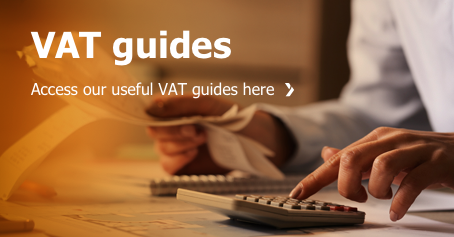Turkey VAT Guide

Nilufer Ereke
Turkey VAT specialist
This is a general guide only and not designed to cover every scenario and the nuances of VAT. Specific advice according to each transaction or supply should always be sought from a VAT specialist.
- What is the tax called?
- What is the tax authority?
- What type of tax is it?
- What is it due on?
- What are the VAT rates?
- What does a VAT number look like?
- Is there a registration limit?
- When does a non-established entity need to register?
- When is the place of supply in the TR?
- Any special rules
- Does a non-established entity need a fiscal representative?
- How often do VAT returns need to be submitted?
- Are penalties imposed for late registration?
- Are penalties imposed in other circumstances?
- Can VAT incurred by non-TR businesses be recovered?
- Can VAT be deducted?
- Do I need to issue an invoice?
What is the tax called?
Katma Değer Vergisi = KDV (in English: Value Added Tax)
What is the tax authority?
Revenue Administration (Gelir İdaresi Başkanlığı)
What type of tax is it?
A type of tax collected from the value generated during the exchange of hands of the goods or services produced.
What is it due on?
Commercial, industrial, agricultural, and independent professional goods and services, goods and services imported into the country, and deliveries of goods and services as a result of other activities are all subject to VAT.
What are the VAT rates?
The generally applied VAT rates are set at 1%, 10%, and 20%
Standard VAT rate
The standard VAT rate is the primary rate of VAT applied to goods and services within a country, covering most items except for certain specific goods and services that may qualify for a reduced rate. Some exceptions include essential items or goods and services that meet certain criteria outlined below. Türkiye applies a standard VAT rate of 20%.
Reduced VAT rates
Türkiye has reduced rates of 10% and 1%.
Below are some goods and services eligible for a reduced value-added tax (VAT) rate:
Rate 10% – Good or Services:
- Certain foods such as meat, milk, dairy products, and produce.
- Textiles.
- Footwear, bags, and other accessories.
- Educational services provided by universities and private schools.
- Tickets for cinema, opera, and ballet.
- Medicines and medical products and services, including imports designated by the Ministry of Health.
- Pharmaceutical raw materials.
- Medical services and those provided in rest homes and facilities for disabled individuals.
- Food catering in certain cafes, restaurants, and similar venues, excluding alcoholic beverages.
- Municipal sewage services.
- Specific machinery supplies for the agricultural, construction, and garment industries.
- Certain types of residential housing.
- Bridge tolls on bridges built under the build-operate-transfer model.
- Select furniture supplies.
Rate 1% – Good or Services:
- Certain types of residential housing supplies.
- Specific unprocessed agricultural products, such as select dried and fresh fruits, nuts, seeds, and grains.
- Wholesale distribution of chicken eggs and fish.
- Wheat flour and bread products.
- Frozen animal sperm.
- Various types of secondhand vehicles.
- Selected asphalt products.
- Funeral services.
- Leasing of transportation vehicles.
- Construction services provided to cooperative societies.
- Various financial leases and supplies of goods to leasing companies.
Exempt From VAT
- Exemptions for transactions involving the import and delivery of precious materials such as gold, silver, and gemstones including diamonds, rubies, emeralds, sapphires, and pearls, when conducted between members of the Turkish stock market. However, this exemption does not extend to transactions between non-members, or from a non-member to a member (or vice versa), and which are exempt with credit.
- Imports of goods and services that are VAT-free domestically, including specific goods exempt from customs duties such as personal belongings brought by travelers and certain marketing and promotional items, for example, samples, models, free advertising publications, and items displayed at exhibitions or fairs.
- Transactions involving the delivery of services, goods, and transport related to or from free trade zones for export purposes, including services. rendered within free trade zones.
- Public services related to education and health sectors.
- Water utilized for agricultural activities.
- Various financial services, including banking, financing, and insurance (subject to a distinct tax on banking and insurance transactions).
- The sale or lease of software and intangible assets to a VAT payer holding an investment incentive certificate.
- Scrap materials including metal, plastic, rubber, paper, glass, as well as scrap and waste from textiles.
- Specific provisions related to the supply of residences.
Zero rated
- Exports, related services, and international transport services including those at ports and airports for ships and aircraft.
- Services provided to non-residents, such as roaming under international agreements, and healthcare including preventive, diagnostic, treatment, and rehabilitation services.
- Services rendered outside Türkiye by local providers (“exported services”).
- Supplies to entities engaged in petroleum exploration, and to diplomatic bodies, consulates, tax-exempt international organizations, and their staff.
- Sales of machinery and equipment to VAT payers with an investment incentive certificate, and similar sales to the Ministry of National Defense.
- Infrastructure development in organized industrial zones, covering water, sewage, energy, and road projects.
- R&D activities leading to patent registration, and sales of specific technology products in development zones, which are zero-rated with VAT deductions.
- Supplies to charities such as schools and healthcare facilities, and sales of new and used print media, excluding adult content and non-print formats.
- New machinery and equipment bought before December 31, 2024, for specified uses in manufacturing and R&D, if used for a minimum of three years.
What does a VAT number look like?
Tax numbers are integrated with the electronic payment system using national ID or corporate tax numbers.
Is there a registration limit?
There is a requirement to register for value added tax for all commercial deliveries of goods and services. There is no lower or upper limit for this registration.
When does a non-established entity need to register?
There is a requirement to register before delivery of goods and services.
When is the place of supply in the TR?
Transactions are made in Türkiye:
a) The goods are in Türkiye at the time of delivery,
b) The service is made in Türkiye or the service is used in Türkiye
The following transactions in Türkiye are subject to value added tax:
1. Deliveries and services made within the framework of commercial, industrial, agricultural activities and freelance activities,
2. Importation of all kinds of goods and services,
3. Deliveries and services arising from other activities:
a) Postal, telephone, telegraph, telex and similar services, radio and television services,
b) Organizing and playing all kinds of games of chance and fortune,
c) Organizing and showing shows and concerts where professional artists take part and sports activities, matches, races and competitions where professional athletes participate,
d) Sales made at auctions and customs warehouses and delivery of product certificates issued in accordance with the Law on Licensed Warehousing of Agricultural Products No. 5300 dated 10/2/2005 to those who will withdraw the product represented by the certificate from the warehouse, [
e) Transportation of crude oil, gas and their products by pipeline,
f) The rental transactions of goods and rights specified in Article 70,
g) Commercial, industrial, agricultural and professional deliveries and services of general and supplementary budget administrations, provincial special administrations, municipalities and villages and the unions they form, universities, associations and foundations, all kinds of professional organizations, institutions established or operated by them, revolving fund organizations or other institutions belonging to or subject to them,
h) Deliveries and services to be taxed as optional liabilities in order to eliminate competitive inequality.
The continuity, scope and nature of commercial, industrial, agricultural activities and freelance activities are determined and determined according to the provisions of the Income Tax Law; in cases where there is no clarity in the Income Tax Law, according to the provisions of the Turkish Commercial Code and other relevant legislation.
The fact that these activities are carried out in accordance with the requirements of the law or official authorities, the legal status and personalities of those who carry them out, whether they are Turkish nationals or not, whether their residence or workplace or legal center or business center is in Türkiye does not change the nature of the transactions and does not constitute an obstacle to taxation.
Whether the import is made by the public sector, the private sector or any real or legal person or carried out in any way and form, does not affect taxation.
Any special rules
The following situations are considered as delivery:
a) Withdrawal of taxable goods from the business for purposes other than taxable transactions, giving taxable goods to the business personnel under the names of wages, premiums, bonuses, gifts, donations, etc.,
b) Use or consumption of taxable goods for goods whose production and delivery are exempt from tax,
c) Transfer of possession in sales made with the condition of preservation of title,
The benefit of a taxable service to the business owner, business personnel or other persons without consideration is considered as service.
Does a non-established entity need a fiscal representative?
There is no difference between non-residents and residents. In order to file a VAT return, they must enter into a consultancy and service agreement with an authorized independent accountant and financial advisor ( CPA ) in Türkiye and send the VAT return electronically to the revenue administration through this authorized person.
How often do VAT returns need to be submitted?
VAT declarations are submitted every month.
Are penalties imposed for late registration?
In Türkiye, VAT is subject to a 5-year statute of limitations. If the Revenue Administration detects a transaction that requires VAT to be declared and paid, the original tax and a one-fold tax loss penalty are collected. In addition, a delay interest is charged for the original tax from the time the tax arises until the collection period.
Are penalties imposed in other circumstances?
There is a penalty that varies depending on whether the return is not submitted at all or not submitted in full. Not declaring at all requires the tax to be assessed ex officio. However, if the return is not declared in full, only the tax remaining in the amount of the deficiency and the tax loss penalty are required. The tax loss penalty is one times the original tax.
Can VAT incurred by non-TR businesses be recovered?
If businesses outside of Türkiye incur VAT in Türkiye and this VAT paid is related to an exemption, the VAT paid can be refunded.
The VAT paid by those who do not have a residence, workplace, legal or business center in Türkiye for goods and services they will purchase for transportation activities and goods and services they will purchase for their participation in fairs, fairs and exhibitions will be refunded on the condition that it is reciprocal.
Can VAT be deducted?
There is a discount mechanism in Value Added Tax in Turkey. With the discount mechanism, tax is calculated at every stage from the production stages of goods and services to the final consumer, and the tax calculated at the previous stage is deducted from the tax calculated at each stage and the remaining tax is transferred to the treasury.
If the Value Added Tax that occurs during the production of goods and services but is not within the scope of the discount remains as Value Added Tax transferred in company records for 5 years as of 01.01.2025, this Value Added Tax will no longer be deductible, and if this review is positive, it will be examined by the inspectors of the Revenue Administration and recorded as an expense in company records and deducted from corporate tax.
Do I need to issue an invoice?
It is mandatory to issue an invoice for the delivery of goods and services.

